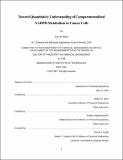Toward Quantitative Understanding of Compartmentalized NADPH Metabolism in Cancer Cells
Author(s)
Moon, Sun Jin
DownloadThesis PDF (9.989Mb)
Advisor
Sikes, Hadley D.
Stephanopoulos, Gregory
Terms of use
Metadata
Show full item recordAbstract
Reduced nicotinamide adenine dinucleotide phosphate (NADPH) is an essential molecule in living organisms by virtue of its function as electron donor driving reductive biosynthesis and protecting cells against oxidative stress. Over the past decades, extensive research has studied key NADPH regeneration pathways and investigated whether targeting these pathways constitutes an effective cancer therapy. However, fundamental questions still remain unanswered. The pool sizes or dynamics of cytosolic and mitochondrial NADPH are unknown and how they interact through varying metabolic processes.
Assessment of compartmentalized NADPH redox states is important as cytosolic and mitochondrial NADPH levels are known to be different due to its impermeability to intracellular membranes, yet it is known to be transported from one compartment to the other by various mechanisms such as metabolite shuttles. NADPH pool sizes can influence metabolic processes to a varying extent and targeting compartment-specific NADPH-dependent enzymes may result in selective and variable responses. Moreover, various metabolic reactions that rely on NADPH are reversible, meaning that altered NADPH redox states can influence metabolic pathway directions in one compartment first, followed by opposite changes in another compartment. Thus, improved understanding of compartmentalized NADPH pool sizes, interactive dynamics and affected metabolic pathways can lead to designing effective cancer therapies by targeting NADPH metabolism.
In this thesis, I investigate compartmentalized NADPH metabolism in cancer cells by developing compartmentalized NADPH dynamics and metabolism analysis platform that incorporates genetically encoded NADPH biosensors to explore mitochondrial NADPH dynamics and analyze NADPH-mediated metabolism using 13C-glcucose isotopic tracers and mathematical models. First, using NADPH sensors, we observed mitochondrial NADPH pool decreased in response to mitochondria-specific oxidative stress, whereas the cytosolic NADPH was minimally influenced. Second, the oxidative pentose phosphate pathway activity and TCA cycle intermediate turnover rates increased in response to decrease of mitochondrial NADPH by mitochondrial oxidative stress. Third, utilizing a kinetic model for mitochondrial antioxidant network, we calculated mitochondrial NADPH/NADP+ ratio and documented an activation of indirect NADPH shuttle system that maintained the mitochondrial NADPH pool. Lastly, we found that the compartmentalized NADPH dynamics varied among different cancer cell lines and perturbing compartment-specific NADPH pools led to cell line specific growth inhibitions in vitro. Altogether, our mitochondrial NADPH sensor and integrated approach led to findings that enhanced our insight into compartmentalized NADPH metabolism that can help advance more selective anticancer therapies.
Date issued
2022-05Department
Massachusetts Institute of Technology. Department of Chemical EngineeringPublisher
Massachusetts Institute of Technology